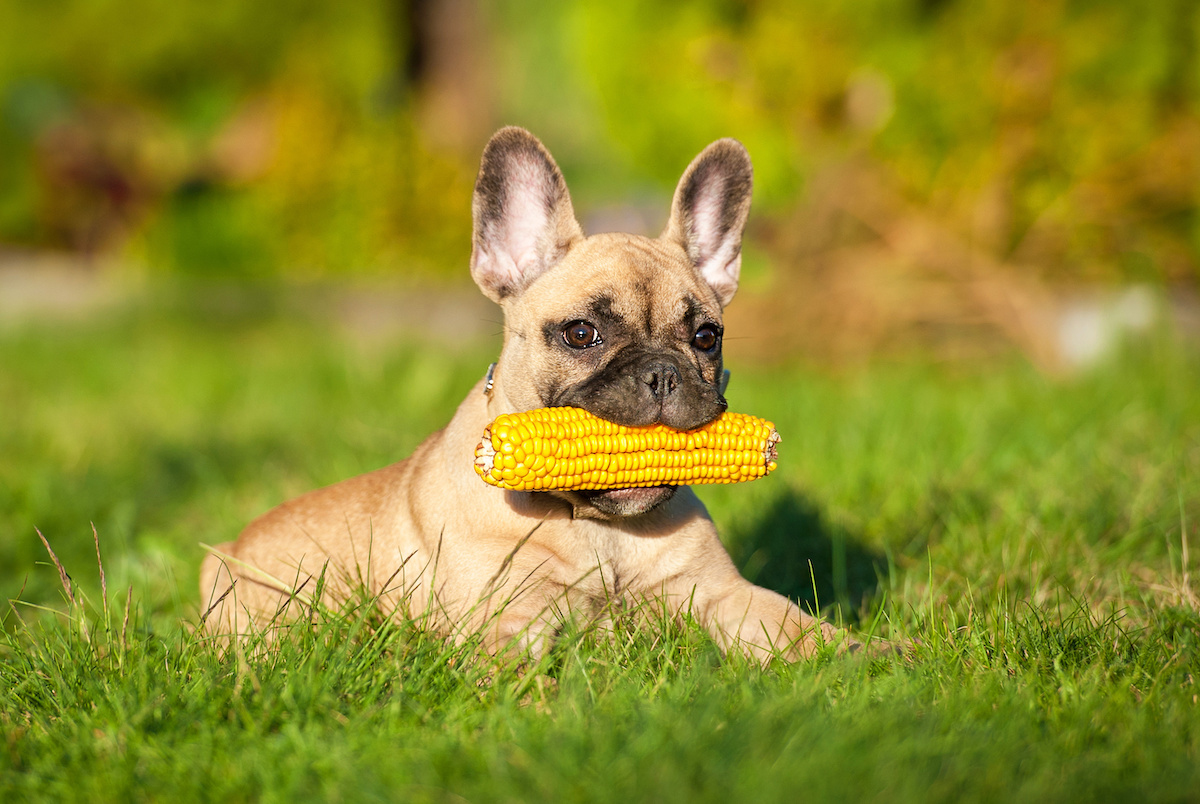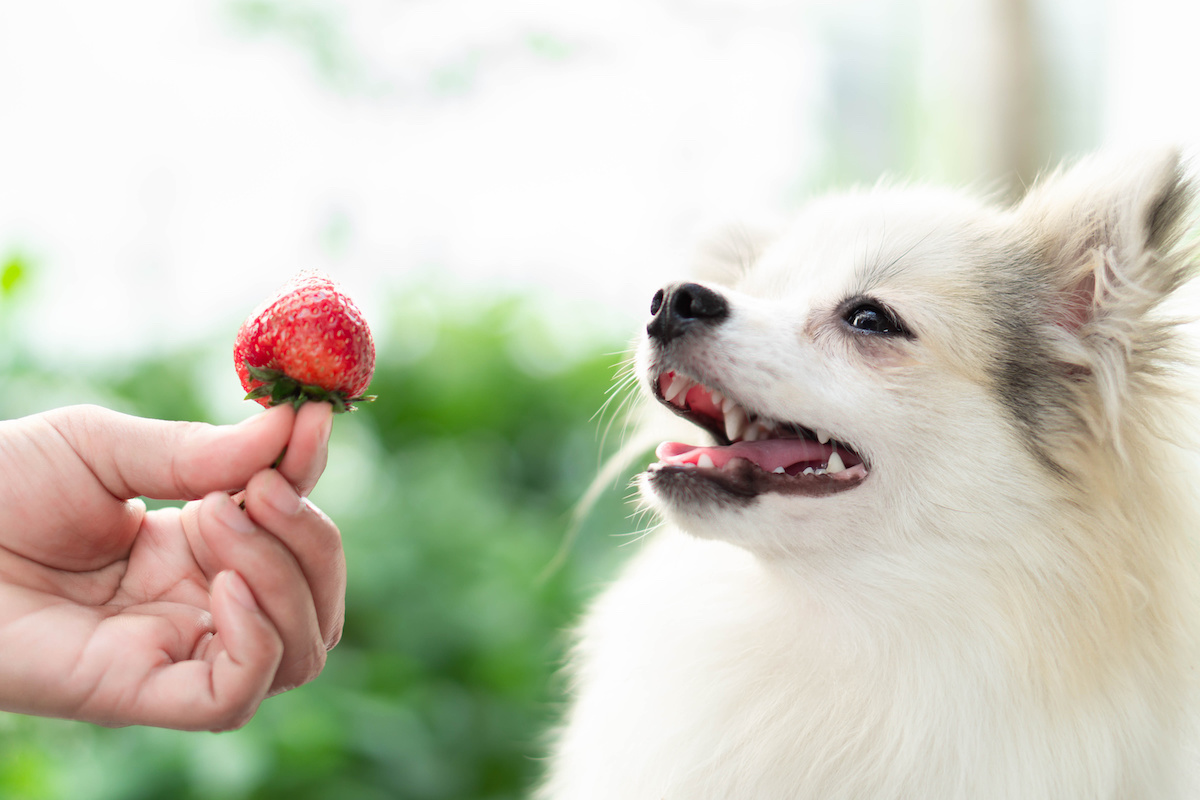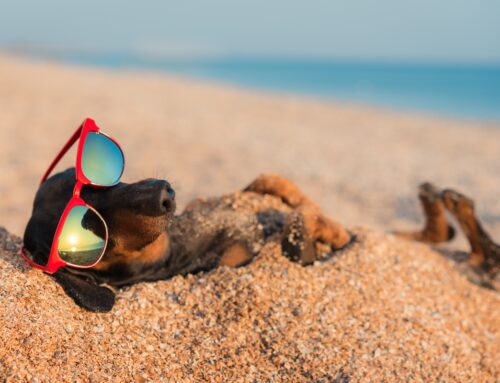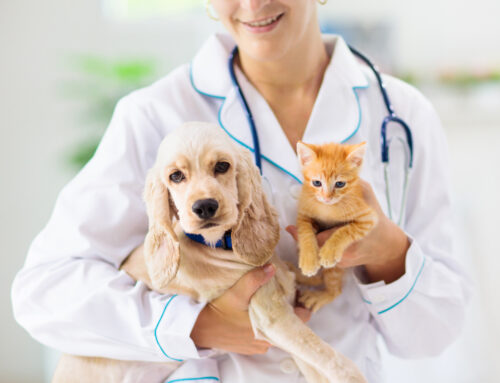Your pup is part of the family. Whether it’s family pizza night or a quick mid-day snack, you probably see a big pair of brown (or maybe blue) eyes staring at you while you eat. It’s hard to resist the begging eyes of a dog, which might have you wondering what dogs can safely eat. Can dogs eat strawberries? How about peaches or onions?
There are some human foods that are safe for your pup’s consumption. While you question the safety of the food you feed your best friend, consider the following advice.
Can Dogs Eat Strawberries?
Let’s start by answering the initial question at hand: can dogs eat strawberries?
Yes! Dogs can eat strawberries. Your fur baby can enjoy the same benefits of strawberries as humans, such as vitamin C and fiber.
Furthermore, strawberries contain an enzyme that can whiten your dog’s teeth as they eat them. While we always encourage routine dental cleanings for your dog, strawberries are healthy for your pup’s teeth.
The only drawback about strawberries is sugar content. Keep in mind that the sugar found in strawberries is not the same as a scoop of vanilla ice cream. Regardless of the natural sugar makeup, you’ll still want to feed strawberries sparingly.
Can Dogs Eat Cheese?
If your dog enjoys chowing down on cheese, we have some good news. Dogs can eat cheese—although there is a “but” that comes along with this answer.
Dogs can eat cheese but it depends on your dog and also the variety of cheese. There are cheeses that stand as healthier alternatives than others, which makes a better choice for your pup.
If you want to feed your dog cheese, stick to low fat cheeses. You can find low fat variation in cheeses such as mozzarella and cheddar.
Cottage cheese is also a good treat for your dog. However, you’ll want to make sure that the cheese is low in sodium. Just like people, too much sodium can be harmful to dogs. Probiotics are found in cottage cheese, which can help soothe a dog’s upset stomach.
There are several cheeses you should avoid giving your dog at all. Do not give your dog blue cheese or any moldy variation of cheese, such as Roquefort. Blue cheese creates a mycotoxin as it ripens which is very harmful to dogs.
When it comes to feeding your dog cheese, these are the general rules to keep in mind:
- Feed your dog small amounts of cheese infrequently. If you’d like to wrap up a pill in cheese every once in a while for your dog to take it, this is OK. Cheese should not be a daily snack for your dog.
- Beware if your dog is lactose intolerant. If you aren’t sure, you can feed your dog a small amount of cheese and monitor their behavior over 24 hours. You’ll want to look for signs such as an upset stomach or negative bathroom changes.
- Ask your veterinarian if you are hesitant about feeding your dog cheese and want additional advice.
Can Dogs Eat Almonds?
Unfortunately, your dog can’t enjoy the nutritious crunch of almonds along with you. Dogs can’t eat almonds as they pose several health complications, especially gastrointestinal.
If your dog manages to get a hold of almonds, you will likely notice the following:
- Gas
- Diarrhea
- Vomiting
- Lethargy
- Loss of appetite
Not only can almonds cause general discomfort, but they can also create blockages in the digestive tract. In the worst case scenarios, a dog may need surgery if they consume too many almonds. One or two almonds shouldn’t be a cause of concern, but more than several almonds can be dangerous.
Almonds can also cause blockages within the windpipe and esophagus, which is more likely to occur in small dogs.
When it comes to foods that are safe for dogs to eat, be sure to cross almonds off the list.

Can Dogs Eat Corn?
When you’re enjoying warm weather and eating corn on the cob from the grill, your dog might be begging for a bite or two.
Can dogs eat corn? Yes! Your dog can eat corn. Like anything else, feed him or her corn in moderation. Corn is often found in dog food and contains several vitamins and minerals.
Corn is a good option for a well-balanced diet for your dog. Just be mindful of how much you feed your pup.
Can Dogs Eat Peaches, Pears, and Cantaloupe?
Peaches, pears, and cantaloupe can feel like a sweet treat to your pup. But are these fruits safe for a dog to eat?
Small amounts of cut up peaches are safe to give to your dog. Because of their natural sugar content, you’ll want to be careful of how much you give your dog. Too many peaches can result in an upset stomach.
Can dogs eat pears? Yes, pears are safe for dogs! Just like peaches, you’ll want to cut up the pears into bite-size pieces so they don’t choke. Make sure you remove the pit and seeds before giving pears to your dog. Pears are great snacks for dogs since they contain a lot of vitamin C.
Can dogs eat cantaloupe? This is also a safe and tasty treat for dogs. The seeds are safe to eat as well, but it’s best if you pull the seeds out first so they don’t cause your dog to choke.
Are Carrots Good for Dogs?
Yes! Carrots are another excellent treat alternative for dogs. Baby carrots work great because they are small and easy to eat. Their crunch and slightly sweet flavor is also favored by dogs.
What other benefits come from dogs eating carrots? Their crunch helps their teeth and gives them something delicious to chew on. They are also low in sugar and low in calories. If your pup needs to lose weight, you can turn to carrots as a tasty treat.
Can Dogs Eat Ham?
Whether it’s Christmas Eve or Easter, many families find ham on the dinner table at some point during the year. You may also opt to get ham from the local deli for sandwiches.
Can dogs eat ham? A small sliver of ham is OK to give your dog every once in a while. But frequently feeding your dog ham isn’t the best idea.
There are several reasons why ham isn’t the best choice for your dog. First, it’s fatty meat. If your dog needs to lose weight, this will not aid in their weight loss efforts.
Second, ham is usually very high in sodium. This applies to full or half-hams that you buy for Easter dinner and ham at the deli as well.
It’s important to note that salt can be toxic to dogs. It can lead to symptoms such as vomiting, diarrhea, and excessive thirst and urination.
If you are debating on giving your dog ham, you can give him or her a small amount. It’s best if you avoid ham in general to avoid any issues.
What can Dogs Not Eat?
As you can see, there is a lengthy list of what dogs can and can’t eat. It’s important to know the foods that dogs can’t eat under any circumstances. Some human foods are very poisonous to dogs and can result in extreme sickness and even death.
- Chocolate: this is perhaps the most common knowledge for dog owners. Chocolate is toxic to dogs and ingesting it can be fatal. Note that baking chocolate is the most toxic variation because of the high content of chocolate liquor, but no chocolate is good for dogs.
- Onions: This is another toxic food for dogs. All parts of an onion are toxic as well as all forms of onion. This includes raw, cooked, powdered, dried and minced.
- Tomatoes: This is a gray area. Unripe tomatoes and tomato plans are generally not safe for dogs. However, ripe tomatoes are OK for dogs to eat in moderation.
- Grapes: both grapes and raisins are toxic to dogs. The toxicity of grapes is so severe that a single grape can be fatal if a dog ingests one. Do not allow your dog to eat any grapes.
- Alcohol: Beware of leaving alcoholic drinks on the floor where your pup can reach it. Alcoholic beverages are toxic to your pup.
- Garlic: Garlic is similar to onions and is not safe for dogs to ingest. In fact, garlic can cause anemia in dogs and results in symptoms such as pale gums.
Can Dogs Eat Strawberries? Ask us Questions About Safe Foods
When in doubt, always ask your veterinarian about safe foods for your pup to eat! We are on standby waiting for your call, with the end goal of keeping your pup as happy and healthy as possible!






